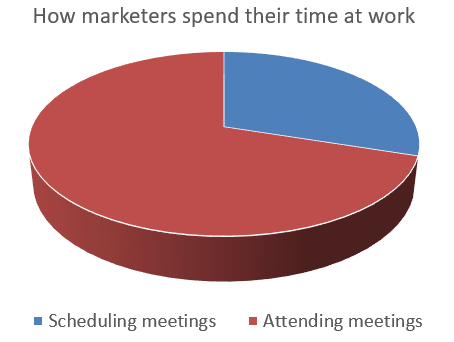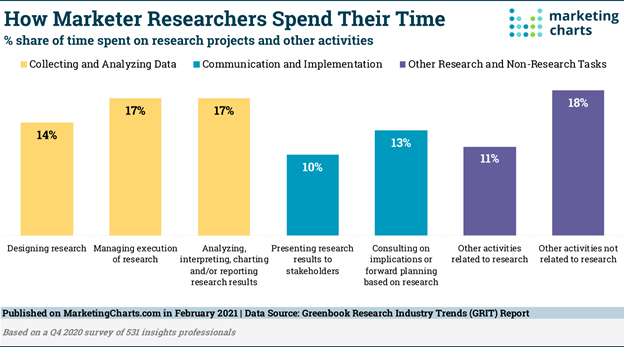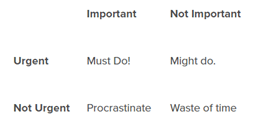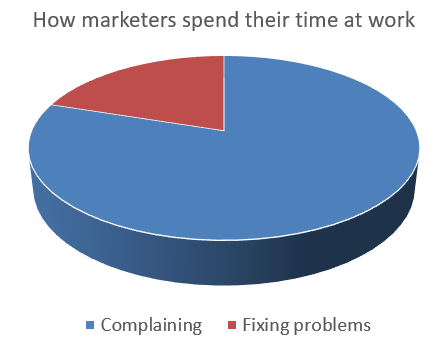The pandemic has dramatically altered how marketers work, likely permanently. It’s too early to tell exactly how daily schedules will be impacted moving forward, so I thought it would be helpful to see how marketers spent their day pre-COVID as a baseline. Research indicates we marketers wasted a tremendous amount of our day prior to the pandemic (not including gaming of course). Perhaps we can learn from our past mistakes to create a more efficient and productive post-pandemic work environment.
A recent global study by Asana of more than 10,000 office workers, reveals marketers waste nearly seven hours each week on pure duplication of work. Only 28 percent of marketers’ time is spent doing the job they were hired to do. Marketers also believe nearly two-thirds of the four and a half hours spent in weekly meetings are unnecessary. Over 60 percent of marketers’ time is spent on low-value or unnecessary tasks such as searching emails for information, managing shifting priorities, sitting in meetings and communicating about the status of projects. The following chart illustrates how I believe we spend time at work, based on my experience:

While meetings can be an essential and productive component of a marketer’s workday, far too often, they become a giant time-suck. I conducted an informal survey of my peers and they agreed meetings are often create obstacles to productivity:


The other major time-suck for marketers is email. Reading and responding to email can be a full-time job. I estimate I minimally spend 20% of my day in email. My peers appear to agree:

If I spend 80 percent of my day in meetings and the remaining 20 percent on email, then when do I get the work done? After hours, as Gina mentions above. I’m not alone, according to research. Nearly 9 in 10 marketers (89 percent) log in to work/work email outside of standard business hours during a typical work week. Here are a few additional compelling statistics about how marketers spend their day:
• 85% of marketers log in on weekends to keep up or catch up with work.
• The average marketer spends almost a third of their time completing repetitive tasks.
• Strategy and planning along with design/content takes up 87 percent of digital marketer’s time, when building campaigns.
The numbers are compelling, but don’t seem to add up. There is a reason for that. The 80/20 rule holds true for marketers (and most professionals): a majority of work is completed in a small amount of time, which frees up the rest of the day to sit in meetings, answer email or, as Chris mentions below, surf social media platforms.

Workfront conducted a comprehensive study and asked the question “what gets in the way of your work” and the answers were not surprising, but frustrating nonetheless:
1. Wasteful meetings
2. Excessive emails
3. Inefficient or non-existent processes
Across all research and disciplines, meetings appear to be the largest culprit of time-sucking. To address the necessary evil of regular meetings, one must be properly armed with a bag of tricks. Unfortunately, very few professionals are trained to host or participate in a meeting. As a member of Entrepreneurs’ Organization, I was introduced to Mastering the Rockefeller Habits years ago and have utilized its meeting methodologies, which have dramatically increased the efficiency and value of our meetings at Anvil.
Routine tasks can be a killer, both to creativity and quality. Repetition breeds boredom, which in turn breeds sloppy errors. HubSpot has identified the most common routine tasks for marketers, as outlined in the chart below:

Not surprisingly, chasing data is the primary culprit. Marketers are accountable for results, which requires measurement. Measurement requires collection and analysis of data. While various analytics tools aid this process tremendously, data still requires a good deal of time to collect, organize and analyze. As mentioned previously, email fills every marketer’s day. Outside of data and email, however, routine tasks, especially for digital marketers, involve landing page creation and optimization, social media and list management. This information may only be a surprise to senior executives or traditional marketers, who are not active in day-to-day execution of marketing activities.
According to MarketingCharts, even market researchers spend nearly 20 percent of their time on non-research-related activities:

When it comes to managing digital marketing campaigns, most professionals prefer to focus their time and effort on strategic planning or design. Unfortunately, only a very small percentage of marketers enjoy data collection, testing, optimizing or reporting. This isn’t surprising, but it is a powerful reminder that senior managers need to hire talent with a passion for data and reporting to round out the marketing team.
We’ve covered how marketers ARE spending their time at work, but now how they SHOULD BE spending their time each day. I’ve put together a few recommendations below that will improve marketer’s efficiency, productivity and all-around success during the workday:
Preparation
As the old saying goes, success is 90 percent preparation and 10 percent perspiration. As such, any successful marketer will spend a few minutes planning at the beginning of each day (bonus points for weekly, monthly and quarterly planning sessions). I typically start my work week on Sundays, reviewing my schedule and setting goals and timelines for various action items for the coming week. One of the best ways to prioritize activities and maximize your time is to use the Urgent vs. Important matrix. In essence, filter each of your activities for the day/week onto one of the four quadrants:

Honesty is key. You must be able to justify your placement on the grid: is this activity truly important AND urgent? Far too many of our daily activities fall within the Not Important or Not Urgent categories and should be ignored. Do you really need to update your Facebook status right this moment? Probably not. Utilize this matrix when planning your day or week and you will see your productivity increase dramatically.
Preparation goes beyond pencil to paper or pixel to Excel spreadsheet. Progressive marketers should consider meditation on a daily basis, even if for just a few minutes. In fact, two minutes seems to be the magic number. Take power posing for example. Just two minutes of posing like a superhero has proven to positively impact performance. Lastly, prepare for virtual meetings properly, as your credibility depends on it.
Professional Development
Far too many of my coworkers and managers over the years devalued professional development. I’m a big believer in the growth-minded philosophy; you can continually improve your personal and professional success via continuous learning. It can start with reading articles and books or watching webinars or YouTube videos. Serious marketers pursue additional training, certifications and formal education. The most overlooked aspect of professional development is building a network, which I’ve valued highly enough to create an organization around it: pdxMindShare.
Connection
While meditation may help you connect with your inner child, it may not facilitate external connections. As mentioned previously, I’m a big fan of networking, but not just to form new relationships. Most of the managers I’ve had over the years were not good about nurturing connections with their employees and other key constituents. I’ve addressed this concern at Anvil by instituting weekly, monthly and quarterly check-ins with employees and clients. Keep in mind, check-ins should be face-to-face if possible, phone if not. Emails do not count as a meaningful touchpoint. To help foster connections at Anvil, we use Insights, Kolbe and 16 Personalities as a framework to communicate internally (and externally with key client contacts).
Reflection
One area with which I struggle is the art of reflection. How can we set a course towards our ideal future as a marketer, without knowing where we’ve been and which direction we’re currently heading? I’m quite comfortable setting goals and measuring progress on a regular basis. I’ve written about this topic in relation to finding The Swing. That said, I could do a much better job evaluating the journey. One approach to reflecting on recent successes or failures, particularly for marketers, is ‘the debrief’. An industry standard protocol, debriefs or post mortems provide a powerful framework for marketers to evaluate campaigns or client relationships. I recommend expanding debriefs to all parts of your workday. The second tool vastly underutilized by marketers, is the practice of mindfulness. Spending just a few minutes a day meditating can provide perspective on past and future performance.
In the end, you’re either part of the problem or part of the solution. Make sure you know you spend your time wisely, or you’ll end up living this pie chart:


Kent Lewis founder of pdxMindShare, an online career community and networking group mentioned on Seth Godin’s blog. Formerly a CMO and founder or co-founder of multiple agencies, he’s known as a thought leader in digital marketing. He’s been an adjunct professor for more than 20 years at Portland State University and a volunteer instructor for SCORE. Lewis co-founded SEMpdx in 2006, a trade organization for search engine marketing professionals. His recognition includes Marketer of the Year by the American Marketing Association and Top 100 Digital Marketing Influencers by BuzzSumo.
